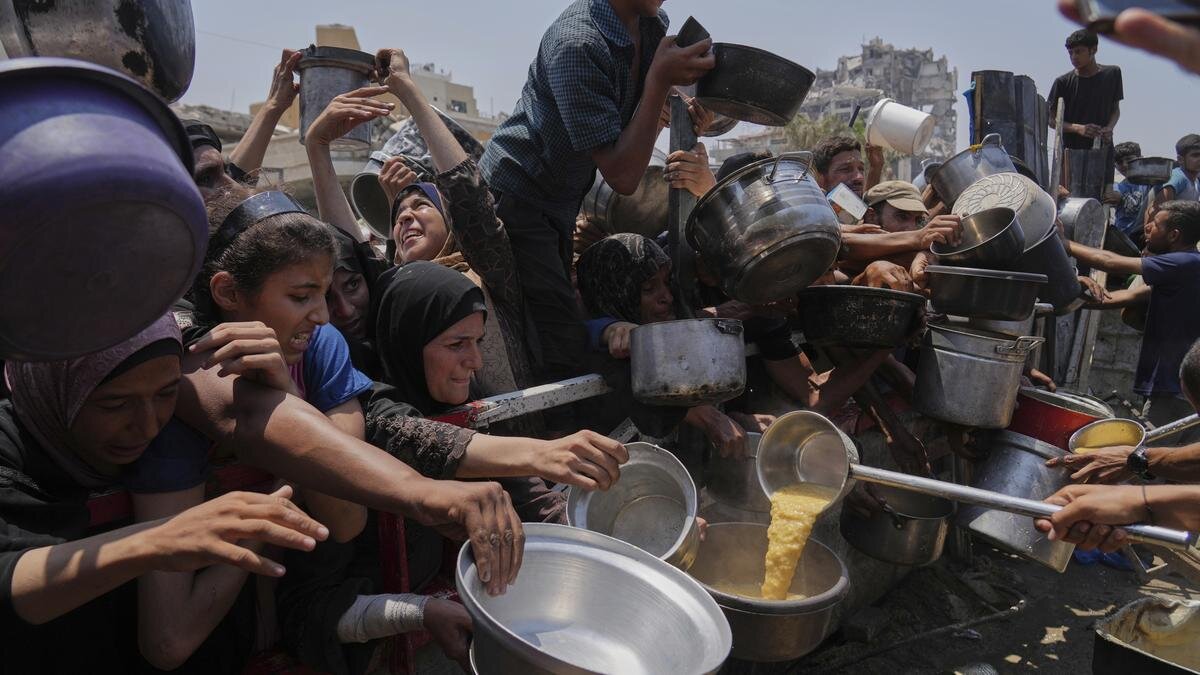Israel-based human rights groups: Gaza crisis is genocide, Western allies enable it

TEHRAN — The starvation crisis in Gaza, largely driven by Israeli actions, continues unabated as Prime Minister Benjamin Netanyahu’s administration makes a symbolic gesture by allowing only a limited trickle of humanitarian aid into the besieged Palestinian territory.
According to Gaza’s Health Ministry on Monday, approximately 150 Palestinians—most of them children—have died of hunger since the start of Israel’s intensified military campaign in October 2023. Fourteen of those deaths occurred within just the past 24 hours. The Government Media Office has issued a dire warning, revealing that over 40,000 infants under one year old are at risk of dying slowly due to the critical shortage of baby formula.
“We urgently demand the immediate and unconditional opening of all crossings and the swift entry of baby formula and humanitarian aid,” the office said in a statement.
Israel’s near-total blockade of aid, in place for months, has drawn condemnation from international observers who accuse it of deliberately weaponizing hunger. Under mounting global pressure, Israel announced over the weekend that it would implement brief humanitarian pauses and conducted limited air drops and truck deliveries. However, these measures have been widely dismissed as insufficient.
Tom Fletcher, the UN’s Under-Secretary-General for Humanitarian Affairs, described the Israeli aid efforts as “a drop in the ocean,” warning that mass starvation is no longer a looming threat—it is a present reality. Similarly, Sam Rose, acting director of UNRWA affairs in Gaza, accused Israel of “manufactured starvation,” suggesting the crisis has been deliberately cultivated over months.
The impact is devastating. Since the start of the war, nearly 60,000 Palestinians have been killed, with countless others injured, displaced, or left to starve.
International legal and human rights organizations have intensified their scrutiny. Israel now faces genocide accusations at the International Court of Justice (ICJ). On Monday, two of Israel’s own leading human rights organizations—B’Tselem and Physicians for Human Rights (PHR)—joined the global condemnation. In a joint report, they stated that Israel is targeting civilians “solely because of their identity as Palestinians,” describing the result as irreparable harm to Palestinian society.
Yuli Novak, director of B’Tselem, emphasized, “Genocide is not just a legal term. It’s a social and political phenomenon—and it is happening now.” Guy Shalev, head of Physicians for Human Rights, added that Israel’s destruction of Gaza’s healthcare infrastructure alone qualifies as genocidal under Article 2(c) of the Genocide Convention.
Crucially, the report also places blame on Israel’s Western allies, arguing they are not mere bystanders but active enablers of this humanitarian disaster.
What is unfolding in Gaza is not a natural disaster, nor a regrettable byproduct of war. It is a systematically engineered crisis, rooted in policies of collective punishment and sustained by indifference from much of the international community.
The use of starvation as a method of warfare is a grave violation of international law. Yet in Gaza, it has become an everyday reality—infants dying, families scavenging for food under the shadow of drones, and hospitals crippled beyond repair.
The world must not turn away. As legal experts, humanitarian agencies, and even Israeli organizations now affirm, the actions taken—or willfully ignored—by Israel in Gaza may well constitute genocide. The responsibility does not lie with Tel Aviv alone. It extends to all governments and institutions that continue to supply arms, shield war crimes from accountability, or treat Palestinian lives as collateral.
Until meaningful pressure is applied and unconditional humanitarian access is restored, Gaza’s children will continue to die—not just from bombs, but from empty stomachs.
